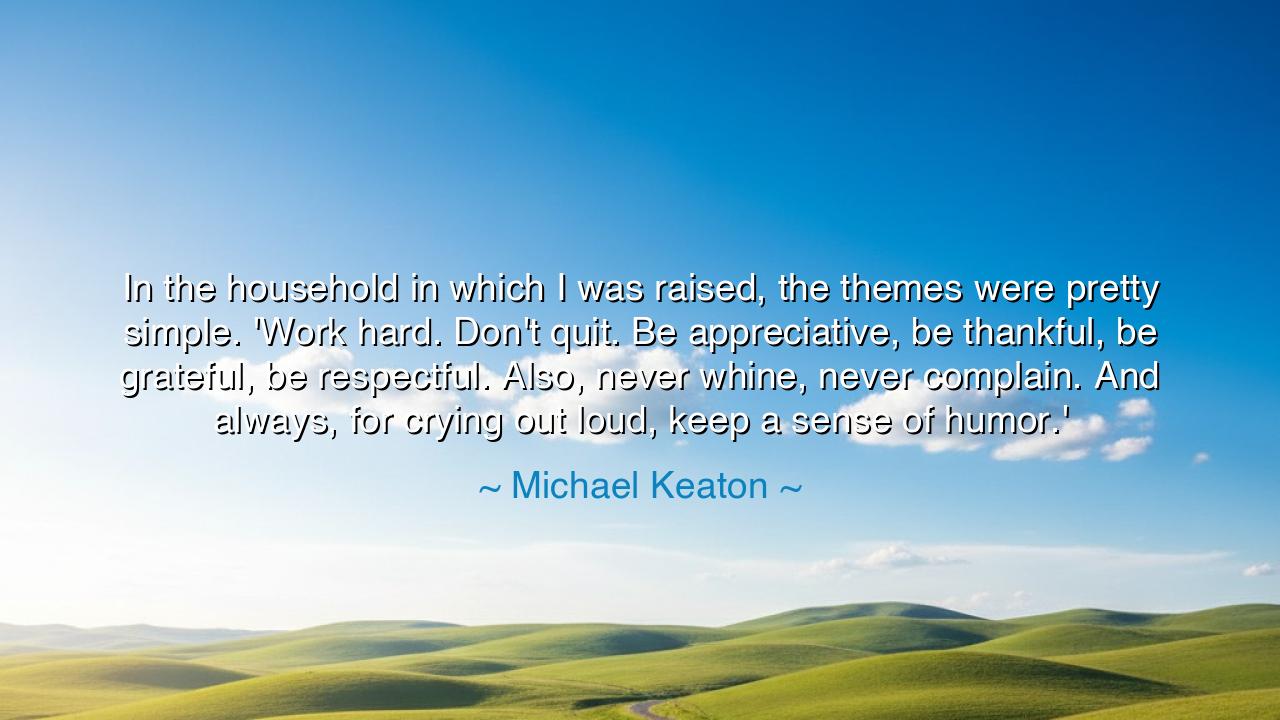
In the household in which I was raised, the themes were pretty
In the household in which I was raised, the themes were pretty simple. 'Work hard. Don't quit. Be appreciative, be thankful, be grateful, be respectful. Also, never whine, never complain. And always, for crying out loud, keep a sense of humor.'






When Michael Keaton said, “In the household in which I was raised, the themes were pretty simple. ‘Work hard. Don’t quit. Be appreciative, be thankful, be grateful, be respectful. Also, never whine, never complain. And always, for crying out loud, keep a sense of humor,’” he was not simply recalling the lessons of his youth — he was echoing the eternal commandments of character, spoken through generations of ordinary people who built extraordinary lives. In his words lies a wisdom as old as civilization itself: that the foundation of greatness is not genius or fortune, but discipline, gratitude, humility, and humor. These are the pillars upon which every enduring soul stands.
The ancients would have nodded in agreement, for they too knew that the strength of a man is tested not in moments of triumph, but in the long, silent struggle of perseverance. “Work hard. Don’t quit.” These are the first two truths of life’s sacred order. The farmer who tills the soil, the craftsman who shapes the stone, the soldier who endures the march — all share the same covenant with life: to labor without complaint and to finish what has been begun. Even the philosopher Epictetus, once a slave, taught that freedom comes not from circumstance, but from endurance. Keaton’s words, though spoken in modern times, carry this same spirit — the call to meet life with effort and constancy, to work not for praise, but for peace within the soul.
Then comes the triad of the heart: “Be appreciative, be thankful, be grateful.” These are not the habits of politeness alone, but the virtues of the awakened soul. Gratitude turns hardship into strength, and scarcity into abundance. The ancients would say that a grateful heart sees the divine even in the smallest gift. To live with gratitude is to walk with lightness, knowing that nothing — not love, not time, not laughter — is owed to us. It is the foundation of joy, the antidote to bitterness. In Keaton’s household, this gratitude was not sentiment, but survival — a way of seeing the world that turns every burden into a blessing.
And then he says, “Be respectful.” In those few words lies a forgotten power. For respect is the thread that binds community, family, and civilization. To respect is to recognize the dignity of others — to bow not in weakness, but in reverence for the shared mystery of being alive. The elders of every age have said the same: a world without respect is a world without order. To respect others, one must first respect oneself — not through arrogance, but through integrity. It is the way of balance, the mark of one who walks with harmony among men.
Yet Keaton’s next commandment strikes with modern clarity: “Never whine, never complain.” In this, there is both humor and holiness. For complaint is the poison of effort; it drains courage and multiplies weakness. The ancients would have said that those who curse the storm forget they are sailors. To suffer with grace, to endure without self-pity — this is the quiet heroism of the strong. It is the difference between bitterness and wisdom. To face life’s difficulties without whining is not denial of pain — it is mastery of it. It is to rise each morning with the words, “I will meet what comes,” and to face the day unbowed.
Finally, the crown of his creed: “For crying out loud, keep a sense of humor.” Here, Keaton reminds us of the divine laughter that sustains the human spirit. The wise of all ages — from Socrates to Abraham Lincoln — knew that humor is the armor of the heart. When the world darkens, laughter keeps the flame alive. To laugh at oneself is to defeat despair; to laugh amid trial is to declare that the soul cannot be conquered. Humor is not the denial of hardship, but its transcendence. It turns life’s absurdities into lessons, its misfortunes into stories. It is the music that makes endurance bearable and gratitude possible.
The lesson, then, is this: A noble life does not require perfection — only perseverance, gratitude, respect, resilience, and laughter. Work hard, not for reward, but for purpose. Never quit, for the path of effort leads to peace. Be grateful for what you have, and you will never be poor. Speak with respect, and you will never walk alone. Refuse to whine, and life will fear to break you. And above all, keep your humor, for it is the song of the unconquered heart.
In this, Michael Keaton’s words become not just a reflection of one man’s upbringing, but a timeless code for living. They are the modern echo of ancient wisdom — a reminder that strength without gratitude is hollow, that labor without laughter is slavery, and that the true measure of a person lies not in what they gain, but in how they carry their burdens with dignity, courage, and joy.






AAdministratorAdministrator
Welcome, honored guests. Please leave a comment, we will respond soon